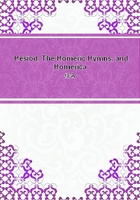
第93章 THE SACK OF ILIUM (fragments)
Fragment #1 --
Proclus, Chrestomathia, ii:
Next come two books of the "Sack of Ilium", by Arctinus of Miletus with the following contents. The Trojans were suspicious of the wooden horse and standing round it debated what they ought to do. Some thought they ought to hurl it down from the rocks, others to burn it up, while others said they ought to dedicate it to Athena. At last this third opinion prevailed. Then they turned to mirth and feasting believing the war was at an end.
But at this very time two serpents appeared and destroyed Laocoon and one of his two sons, a portent which so alarmed the followers of Aeneas that they withdrew to Ida. Sinon then raised the fire-signal to the Achaeans, having previously got into the city by pretence. The Greeks then sailed in from Tenedos, and those in the wooden horse came our and fell upon their enemies, killing many and storming the city. Neoptolemus kills Priam who had fled to the altar of Zeus Herceius (1); Menelaus finds Helen and takes her to the ships, after killing Deiphobus; and Aias the son of Ileus, while trying to drag Cassandra away by force, tears away with her the image of Athena. At this the Greeks are so enraged that they determine to stone Aias, who only escapes from the danger threatening him by taking refuge at the altar of Athena.
The Greeks, after burning the city, sacrifice Polyxena at the tomb of Achilles: Odysseus murders Astyanax; Neoptolemus takes Andromache as his prize, and the remaining spoils are divided.
Demophon and Acamas find Aethra and take her with them. Lastly the Greeks sail away and Athena plans to destroy them on the high seas.
Fragment #2 --
Dionysus Halicarn, Rom. Antiq. i. 68:
According to Arctinus, one Palladium was given to Dardanus by Zeus, and this was in Ilium until the city was taken. It was hidden in a secret place, and a copy was made resembling the original in all points and set up for all to see, in order to deceive those who might have designs against it. This copy the Achaeans took as a result of their plots.
Fragment #3 --
Scholiast on Euripedes, Andromache 10:
The Cyclic poet who composed the "Sack" says that Astyanax was also hurled from the city wall.
Fragment #4 --
Scholiast on Euripedes, Troades 31:
For the followers of Acamus and Demophon took no share -- it is said -- of the spoils, but only Aethra, for whose sake, indeed, they came to Ilium with Menestheus to lead them. Lysimachus, however, says that the author of the "Sack" writes as follows:
`The lord Agamemnon gave gifts to the Sons of Theseus and to bold Menestheus, shepherd of hosts.'
Fragment #5 --
Eustathius on Iliad, xiii. 515:
Some say that such praise as this (1) does not apply to physicians generally, but only to Machaon: and some say that he only practised surgery, while Podaleirius treated sicknesses.
Arctinus in the "Sack of Ilium" seems to be of this opinion when he says:
(ll. 1-8) `For their father the famous Earth-Shaker gave both of them gifts, making each more glorious than the other. To the one he gave hands more light to draw or cut out missiles from the flesh and to heal all kinds of wounds; but in the heart of the other he put full and perfect knowledge to tell hidden diseases and cure desperate sicknesses. It was he who first noticed Aias'
flashing eyes and clouded mind when he was enraged.'
Fragment #6 --
Diomedes in Gramm., Lat. i. 477:
`Iambus stood a little while astride with foot advanced, that so his strained limbs might get power and have a show of ready strength.'
ENDNOTES:
(1) sc. knowledge of both surgery and of drugs.